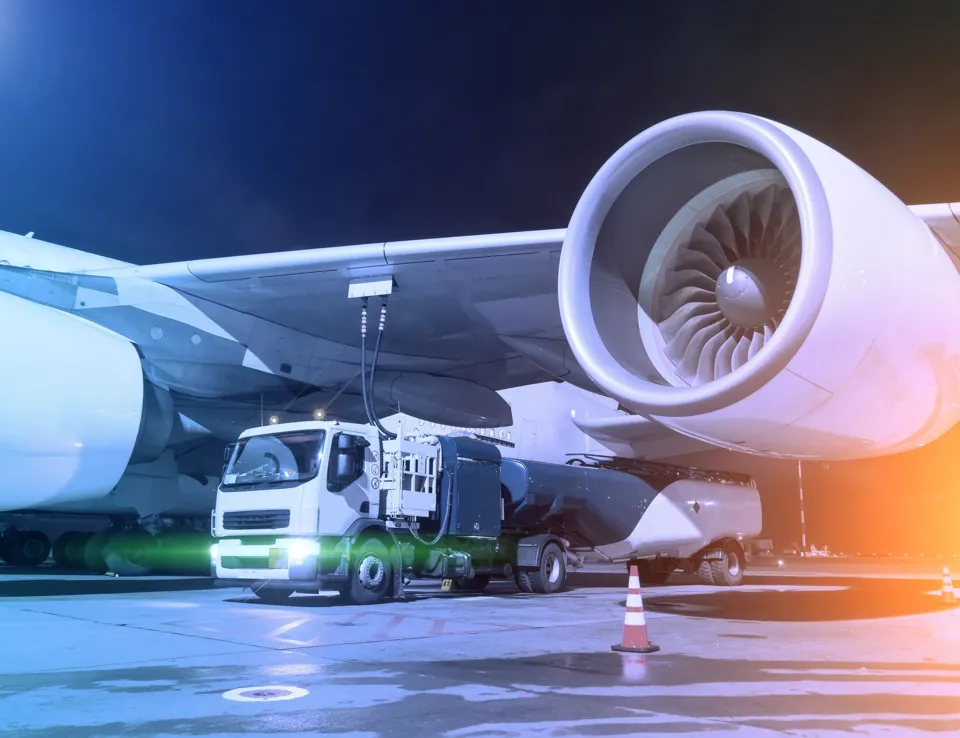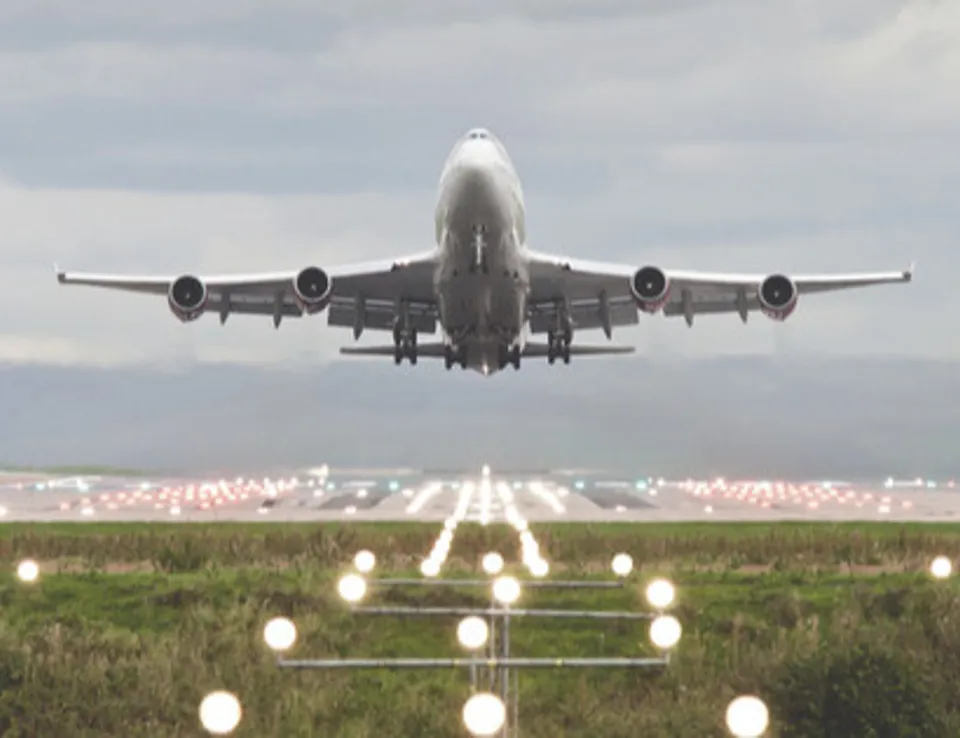Sustainable Aviation Fuels
What is sustainable aviation fuel (SAF)?
The aviation industry accounts for approximately 2 to 3% of global CO₂ emissions
Sustainable aviation fuels (SAF) is a carbon-reduction solution which reduces CO₂ emissions by up to 80% over the lifecycle of the fuel compared to traditional jet fuel it replaces
The International Air Transport Association (IATA) wants members (120 countries) to increase from 5% SAF use in 2030 to 65% in 2050 and the European Parliament has mandatory targets for airlines in Europe to use SAF
Airlines must ensure that 2% of fuel is from sustainable sources in 2025. The target will then increase to 6 per cent in 2030, 20 per cent in 2035 and then 70 per cent by 2050 and from 2025 airlines will be able to market flights with EU label for environmental performance
SAF plays a piviotal role as the favoured solution for short-to-medium term decarbonisation of the aviation sector and is fundamental to the decarbonisation of the aviation sector in the upcoming decades.

Benefits of working with Ricardo
-
Access to engineers who understand SAF technologies and anticipate technological and industry changes, securing you green competitive advantage
-
Comfort knowing you are working with scientists who identify viable sustainable options to decarbonise aviation operations and experience across the aviation value chain
-
Insight into current and emerging regulatory trends to future-proof business decisions and avoiding risk with support from experts who have been involved in developing government policy and supporting investment in new innovations in SAF
-
Security knowing you will be supported by dedicated environmental consultants who will ensure compliance with regulatory requirements
-
Access to a large team of LCA practitioners who have been working for over 20 years on life cycle assessment.
How can we support you with sustainable aviation fuel (SAF)?
-
Expert technical and financial knowledge to review and recommend different SAF feedstocks and production technologies
-
Investment analysis for fuel production plants : pre-feasibility, technical and financial analysis and due diligence
-
Assessment of environmental impacts of different feedstocks and production pathways throughout the entire production and use lifecycle – in order to meet decarbonisation objectives
-
Supporting airports and airlines to achieve regulatory compliance with SAF mandates, environmental targets, safety and certification
-
Policy and regulatory advice in relation to SAF production, approval, certification and sustainability.
The sustainable aviation fuel (SAF) production and value chain
Our expertise covers all types of feedstocks, such as biomass, waste, and renewable energy:
- We have quantitative models that assess the availability of SAF feedstocks, nationally and globally.
We understand the competing demand for feedstocks from other sectors
- We have analysed the current and potential feedstock availability for low carbon transport fuels in the UK and can replicate this in any jurisdiction.
We understand SAF feedstocks and production technologies and their alternatives, across different geographies
- We have experience of assessing the technical and financial viability of SAF in various geographies. For example, an assessment of potential for green SAF production from palm oil and residues in Colombia
- We have chemical engineers with expertise in CCUS, CO2 production, and the energy needs for green hydrogen/e-fuels production
- We have completed technical and market due diligence studies for specific feedstocks for major asset investment firms
- We have waste specialists with detailed knowledge of waste composition across many different countries who have assessed the potential for SAF.
We have a large team of LCA practitioners who understand the cradle to grave production pathways
- We perform assessments of different production pathways in accordance with LCA standards and methods such as ISO14040, PEF or RED III
- We have a forensic knowledge of sustainability criteria and life-cycle GHG emission assessment methods and standards for alternative marine fuels.
Pre-feasibility technical and financial analysis for investment on SAF producing capabilities
- We assessed the technical feasibility of manufacturing SAF at a large UK refinery
Life-cycle assessment of the entire production chain
- We performed a multi-indicator environmental assessment of Fisher-Tropsch technology, assessing 4 fuel pathways against traditional kerosene
- We can assess the environmental impacts associated with SAF production pathways and feedstock to ensure compatibility with exports and use under international schemes (e.g. EU ETS, CORSIA)
Supporting market access and enabling conditions for fuel suppliers
- We are running many government programmes providing funding for SAF developers, completing technical due diligence on their projects and providing technical advice to the developer
- We are delivering the UK SAF clearing house and EU SAF clearing house
- Evaluate the technical and economic feasibility, and market conditions for SAF, including fiscal policy and regulatory constraints
- Regulatory support on compliance requirements (SAF mandates, safety, certification, etc.)
- Technical support on the logistics needed to handle SAF
- Sustainability policy updates on the regulations around the use and availability of SAF across different geographies
- Assessing the operational and financial impacts of these policies to airlines
- We support governments in low carbon fuels policy development and implementation, including SAF and other fuels
- We analyse the regulatory landscapes to identify the optimal policy measures to promote the production and use of SAF in different geographies
- We advise on public interventions to reduce production costs, promote fuel suppliers’ access to markets and incentivise demand
The 'Jet zero' strategy sets out how the UK Government plans to meet its commitment that aviation emissions from the UK will, like those from every other sector, be brought down to net zero by 2050, with sub-targets to make domestic flights and airports net zero by 2040. The key themes in this strategy are:
- System efficiencies
- Sustainable aviation fuels
- Zero emission flight
- Markets and removals
- Influencing consumers
- Addressing non-CO2.
Ricardo's multidisciplinary team of engineers, scientists and consultants have been working with in the aviation sector for over 100 years driving change within airports, airlines and aircraft manufacturers to reduce their environmental impact and improve their sustainability.

Aviation News & Updates

Understanding the changes impacting the aerospace and aviation sectors on the road to decarbonisation.
Read articleOUR AVIATION EXPERTS
Find out more about our experts and their experience in the aviation industry




 Ricardo Sustainability, Clean Energy and Environment
Ricardo Sustainability, Clean Energy and Environment






